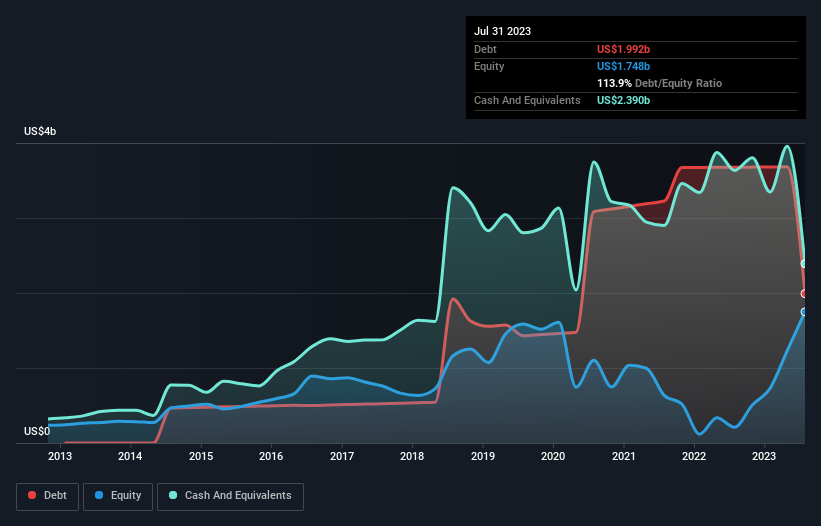
The external fund manager backed by Berkshire Hathaway's Charlie Munger, Li Lu, makes no bones about it when he says 'The biggest investment risk is not the volatility of prices, but whether you will suffer a permanent loss of capital.' When we think about how risky a company is, we always like to look at its use of debt, since debt overload can lead to ruin. We can see that Palo Alto Networks, Inc. (NASDAQ:PANW) does use debt in its business. But should shareholders be worried about its use of debt?
Why Does Debt Bring Risk?
Generally speaking, debt only becomes a real problem when a company can't easily pay it off, either by raising capital or with its own cash flow. In the worst case scenario, a company can go bankrupt if it cannot pay its creditors. While that is not too common, we often do see indebted companies permanently diluting shareholders because lenders force them to raise capital at a distressed price. Of course, the upside of debt is that it often represents cheap capital, especially when it replaces dilution in a company with the ability to reinvest at high rates of return. When we think about a company's use of debt, we first look at cash and debt together.
See our latest analysis for Palo Alto Networks
What Is Palo Alto Networks's Debt?
The image below, which you can click on for greater detail, shows that Palo Alto Networks had debt of US$1.99b at the end of July 2023, a reduction from US$3.68b over a year. But it also has US$2.39b in cash to offset that, meaning it has US$398.5m net cash.

How Healthy Is Palo Alto Networks' Balance Sheet?
The latest balance sheet data shows that Palo Alto Networks had liabilities of US$7.74b due within a year, and liabilities of US$5.02b falling due after that. On the other hand, it had cash of US$2.39b and US$2.85b worth of receivables due within a year. So its liabilities outweigh the sum of its cash and (near-term) receivables by US$7.51b.
Since publicly traded Palo Alto Networks shares are worth a very impressive total of US$76.0b, it seems unlikely that this level of liabilities would be a major threat. However, we do think it is worth keeping an eye on its balance sheet strength, as it may change over time. While it does have liabilities worth noting, Palo Alto Networks also has more cash than debt, so we're pretty confident it can manage its debt safely.
It was also good to see that despite losing money on the EBIT line last year, Palo Alto Networks turned things around in the last 12 months, delivering and EBIT of US$387m. When analysing debt levels, the balance sheet is the obvious place to start. But ultimately the future profitability of the business will decide if Palo Alto Networks can strengthen its balance sheet over time. So if you're focused on the future you can check out this free report showing analyst profit forecasts.
Finally, a business needs free cash flow to pay off debt; accounting profits just don't cut it. Palo Alto Networks may have net cash on the balance sheet, but it is still interesting to look at how well the business converts its earnings before interest and tax (EBIT) to free cash flow, because that will influence both its need for, and its capacity to manage debt. Over the last year, Palo Alto Networks actually produced more free cash flow than EBIT. There's nothing better than incoming cash when it comes to staying in your lenders' good graces.
Summing Up
While it is always sensible to look at a company's total liabilities, it is very reassuring that Palo Alto Networks has US$398.5m in net cash. And it impressed us with free cash flow of US$2.6b, being 679% of its EBIT. So is Palo Alto Networks's debt a risk? It doesn't seem so to us. When analysing debt levels, the balance sheet is the obvious place to start. But ultimately, every company can contain risks that exist outside of the balance sheet. Be aware that Palo Alto Networks is showing 2 warning signs in our investment analysis , you should know about...
Of course, if you're the type of investor who prefers buying stocks without the burden of debt, then don't hesitate to discover our exclusive list of net cash growth stocks, today.
New: Manage All Your Stock Portfolios in One Place
We've created the ultimate portfolio companion for stock investors, and it's free.
• Connect an unlimited number of Portfolios and see your total in one currency
• Be alerted to new Warning Signs or Risks via email or mobile
• Track the Fair Value of your stocks
Have feedback on this article? Concerned about the content? Get in touch with us directly. Alternatively, email editorial-team (at) simplywallst.com.
This article by Simply Wall St is general in nature. We provide commentary based on historical data and analyst forecasts only using an unbiased methodology and our articles are not intended to be financial advice. It does not constitute a recommendation to buy or sell any stock, and does not take account of your objectives, or your financial situation. We aim to bring you long-term focused analysis driven by fundamental data. Note that our analysis may not factor in the latest price-sensitive company announcements or qualitative material. Simply Wall St has no position in any stocks mentioned.
About NasdaqGS:PANW
Reasonable growth potential with adequate balance sheet.
Similar Companies
Market Insights
Community Narratives



